If you’ve missed the recent excitement around AI, you’ve most likely been living under a rock. Artificial Intelligence has started revolutionizing industries worldwide, with applications ranging from autonomous vehicles to natural language processing. If you’re looking to be part of the “golden age of AI,” now is high time to build expertise in its underlying frameworks. Glassdoor reports that the average salary of an AI Engineer in the United States is $160,785 per year, and this field offers similarly high and attractive salaries in other parts of the world as well. So, it’s worth paying extra attention when choosing your first program for learning AI, as it lays the foundation for your future success as a practitioner or researcher.
The IBM AI Engineering Professional Certificate is a comprehensive learning program offered on Coursera. It is primarily designed for intermediate-level learners and is well suited to equip them with the expertise and knowledge required to pursue and excel in the demanding and rapidly growing domain of Artificial Intelligence. As I had heard good things about this program, I wanted to try it out myself – you’ll find my review below.
Table of Contents
Overview of the IBM AI Engineering Professional Certificate
As an AI enthusiast with some prior experience in machine learning and Python, I was eager to expand my skill set and deeper knowledge of AI engineering. My expectations were high, given IBM’s reputation as a leader in AI research and development. I anticipated a well-structured and comprehensive curriculum that would provide both theoretical knowledge and practical implementation.
Moreover, I hoped to gain insights into cutting-edge AI technologies and their applications in real-world scenarios. Additionally, I wanted to explore the capabilities of AI platforms like TensorFlow and understand their role in shaping the future of AI engineering.
The IBM AI Engineering Professional Certificate can be considered by beginners and professionals alike. Although it may seem intimidating for beginners initially, it is certainly achievable, especially if they grasp the importance of acquiring expertise in the tools taught in the course. Despite the courses being intermediate level, the instructors provide a high-level overview that is helpful and sufficient for beginners to conveniently follow along. Similarly, professionals can also benefit from taking this course, as its comprehensive coverage of important tools, libraries, and frameworks can significantly contribute to their career growth.
However, overall, the course is best suited for students and learners with at least a basic understanding of core concepts in Machine Learning and Deep Learning, and of coding in general.
The program does a very good job of covering the most important and widely used frameworks in its different courses. For example, in course number 2, the focus is on the Keras library, and in course number 4, TensorFlow is introduced. Additionally, in course 5, PyTorch, another very useful framework used in Deep Learning, is covered.
How much does the Professional Certificate cost? And is it worth it?
The IBM AI Engineering Professional Certificate, available on Coursera, is reasonably priced, considering the depth and breadth of the content. The program operates on a monthly subscription model, costing $49 per month. Given that the course is designed to be completed in about two months at a self-paced rate, the total expenditure would only be approximately $98 if you stick to the suggested timeline.
It’s worth noting that this particular Professional Certificate isn’t part of the Coursera Plus subscription and, therefore, requires a separate purchase. However, if you’re mindful of your budget, you can aim to finish the program in less than the recommended two months, which could halve the overall cost.
Additionally, Coursera allows you to audit the individual courses within this Professional Certificate at no cost. This option provides an opportunity to delve into the course content before making a financial commitment.
In summary, the IBM AI Engineering Professional Certificate offers a comprehensive learning journey and represents a sound investment for those looking to bolster their back-end development expertise.
Detailed review
Syllabus overview
The certificate’s syllabus is richly and pragmatically designed, starting with the fundamentals in the first course and progressively incorporating in-demand and famous libraries/frameworks such as SciPy, Scikit-Learn, Keras, PyTorch, and TensorFlow.
The certificate comprises six courses ordered as follows, with their difficulty levels mentioned:
- Machine Learning with Python (Intermediate)
- Introduction to Deep Learning & Neural Networks with Keras (Intermediate)
- Introduction to Computer Vision and Image Processing (Beginner)
- Deep Neural Networks with PyTorch (Intermediate)
- Building Deep Learning Models with TensorFlow (Intermediate)
- AI Capstone Project with Deep Learning (Advanced)
Let’s have a look at each of these in more detail.
Course 1: Machine Learning with Python
This module explains the fundamentals of machine learning algorithms and their applications. The practical exercises reinforced the concepts, and the use of real-world datasets added relevance to the learning experience. The instructors provided clear explanations and practical examples, helping learners grasp complex concepts effectively. As this is the primary module, the level of in-video questions, ungraded and graded quizzes are easy to attempt. For beginners, it is easy to understand with a proper understanding of the concepts.
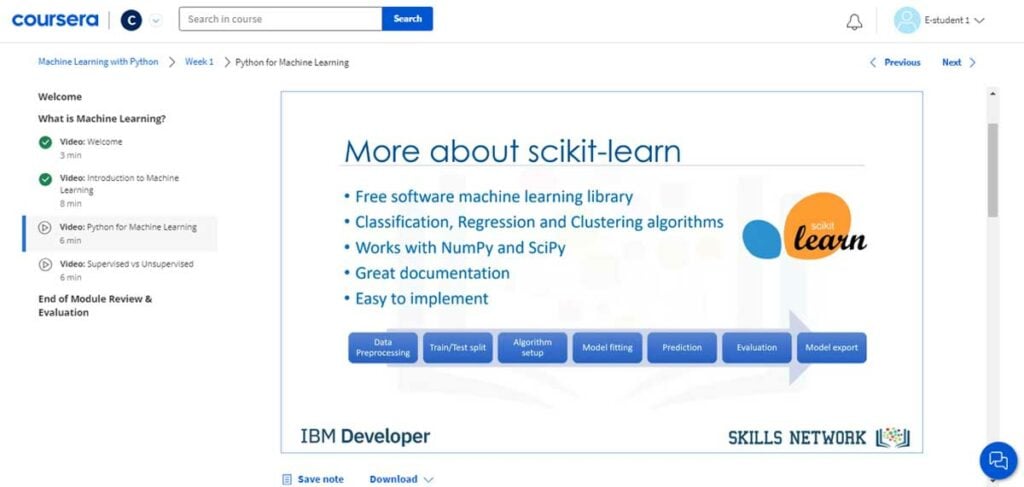
The course started with a comprehensive overview of AI concepts, followed by hands-on Python programming exercises. While it was beginner-friendly, the pacing could have been slightly faster for learners familiar with Python. The content, though fundamental, was presented effectively, catering to learners with varying levels of programming experience. Here is one of the examples where the author skillfully elucidates the concept of regression on the slide by employing clear and concise language coupled with relevant visuals. Additionally, real-life examples and analogies effectively illustrate the practical applications of regression, enhancing the audience’s understanding and engagement.
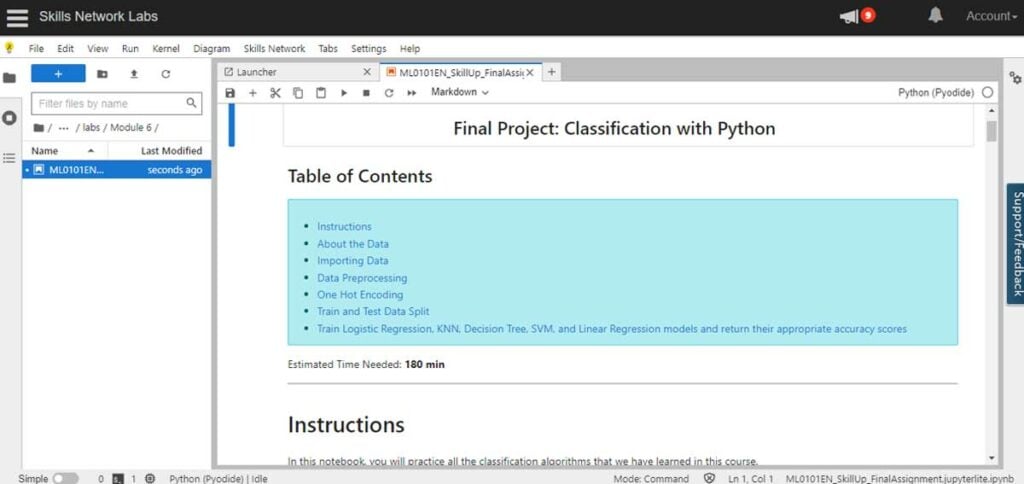
Course 2: Introduction to Deep Learning & Neural Networks with Keras
In the second course in the certificate, “Introduction to Deep Learning & Neural Networks with Keras,” the focus shifts from learning and practicing traditional Machine Learning to the exciting subdomain of Deep Learning, covering both supervised and unsupervised learning and the related concepts and algorithms. The fundamental concepts of Deep Learning, such as Neurons and Neural Networks, are presented in a very effective manner by mainly looking at real-world use cases.
An important feature of this module is the introduction to Keras and its usage in the development of deep learning models. This module is also concluded with a peer-graded project, which helps solidify the concepts learned in the module.
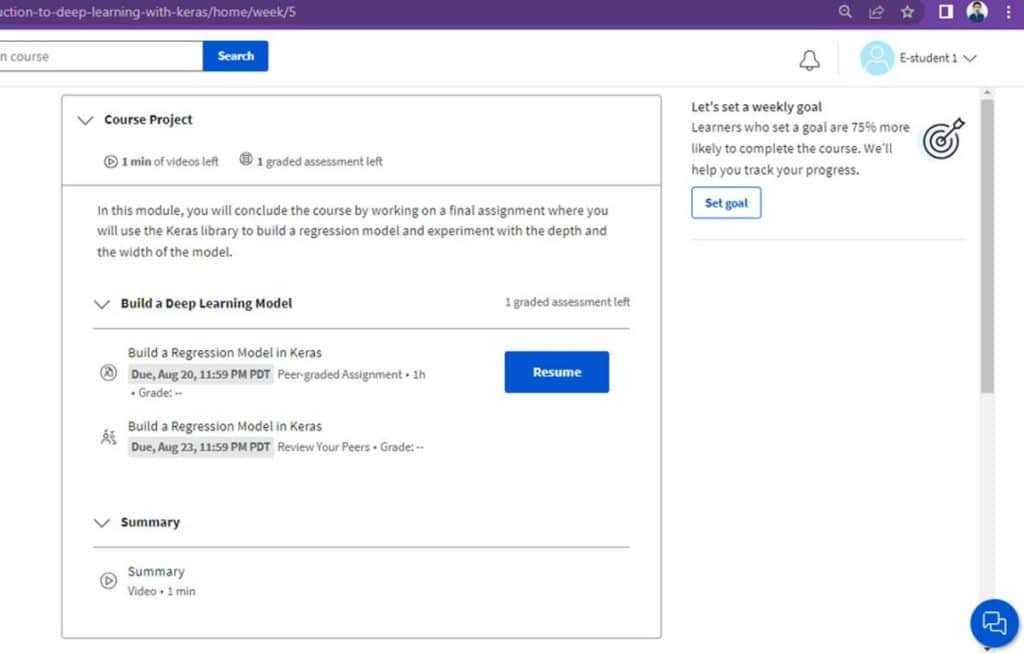
Course 3: Introduction to Computer Vision and Image Processing
After the basics of Deep Learning with Keras are covered, the third course, “Introduction to Computer Vision and Image Processing,” looks at not only fundamentals of Computer Vision but also its application across various industries, helping to serve as motivation for learners.
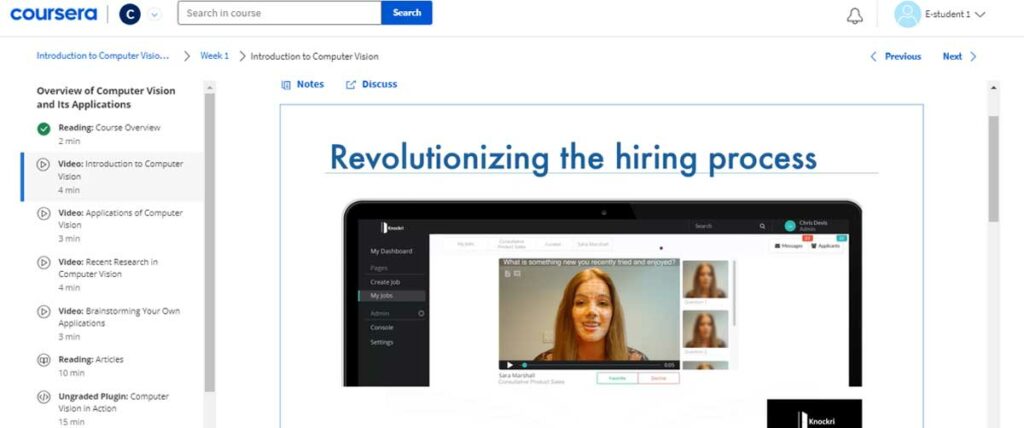
I found the peer-graded project for this course is particularly useful, and one that could be used as part of a student’s portfolio. However, I found the content of this course somewhat lacking in more advanced implementations in this area, and would recommend complementing it with another course on the computer vision.
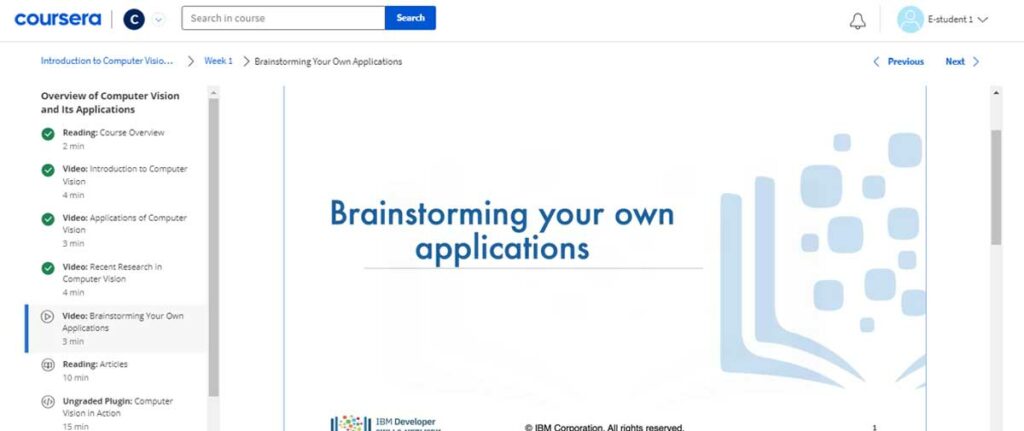
Course 4: Deep Neural Networks with PyTorch
In the fourth course, “Deep Neural Networks with PyTorch,” another widely used Machine Learning framework is introduced. The basic concepts of PyTorch, such as PyTorch’s tensors and its Automatic Differentiation package, are covered thoroughly in this course. Not only does it include how PyTorch relates to fundamental models such as Linear Regression and Logistic Regression, but also more advanced topics in Deep Learning, such as Feedforward neural networks, activation functions, normalization, and dropout layers.
Course 5: Building Deep Learning Models with TensorFlow
The fifth course is all about TensorFlow – a popular free and open-source Python library widely used for developing Deep Neural Networks. The development of deep learning models is presented in a practical way – I particularly appreciate how the practical labs are preceded by clear explanations of the relevant concepts, including the main functions and various pipelines of execution.
Course 6: AI Capstone Project with Deep Learning
The sixth course is a capstone that is designed to reinforce the learning from the previous five courses, assess the skills acquired, and showcase the project as part of a portfolio for potential employers. The capstone project is well designed, making the learner figure out on his/her own what library to choose, as well as considering the lifecycle of an actual deep learning project, including data gathering, pre-processing, building, testing, and validating the model.
Conclusion and recommendations
The “IBM AI Engineering Certificate” by IBM is highly recommended for both students and current professionals seeking to pursue careers in AI as AI Engineers, ML/DL Engineers, or similar.
The courses in the certificate are thoughtfully designed, exposing learners to the core fundamentals of machine learning and deep learning. Notably, the curriculum covers all major and well-known machine learning and deep learning libraries and frameworks, including SciPy, ScikitLearn, Keras, PyTorch, and TensorFlow. This comprehensive coverage sets the certificate apart and empowers learners to stand out in the competitive field.
The capstone project at the end of the course serves as a significant reinforcement of all the learning undertaken throughout the certificate program. Completing this project not only solidifies the learners’ skills but also provides them with an employer-recognizable badge and certificate, which can be highly appealing to potential employers. For aspiring students, this certificate serves as a valuable starting point for their journey into the world of AI, while for professionals, it offers an opportunity to advance their careers and expertise.
$100 USD off your first year of Coursera Plus Annual (expires 1 April 2024)




